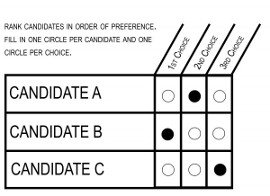Stephen Vance, Staff
 The ballots in the 2022 municipal election could ask Meaford voters for more than their council selections. At their September 28 meeting, Council gave committee of the whole approval to include a question on the ballot asking electors if they support the use of ranked choice voting beginning in 2026.
The ballots in the 2022 municipal election could ask Meaford voters for more than their council selections. At their September 28 meeting, Council gave committee of the whole approval to include a question on the ballot asking electors if they support the use of ranked choice voting beginning in 2026.
“In 2016, the Municipal Elections Act was updated to permit the use of ranked choice voting in municipal elections,” Municipal Clerk Matt Smith advised in a report to Council. “Ranked Choice Voting, or ‘Ranked ballots’, is a replacement for the traditional voting method where an elector chooses one candidate for each available position. In a ranked choice election, electors list the candidates in numerical order according to their preference.”
Smith told Council that ranked choice voting is designed to “ensure that all electors’ votes are valuable, particularly in cases where the preferred candidate receives a low level of support.”
While presenting the idea to Council, the Clerk explored the pros and cons of ranked ballots.
“Ranked choice voting, and other proportional systems, promote the idea of majority support for elected officials. With the current voting system, candidates can be elected with a small percentage of the vote where there are several evenly split candidates. Ranked choice, particularly for single-seat elections such as the mayoral contest, ensures that the winner has been chosen by at least 50% of the voters,” Smith told Council in his report. “Ranked choice voting should lead to less negative campaigning, as candidates are looking for support as first, second, third, etc. choices, rather than just as the top choice. There is therefore much less incentive to denigrate opponents. Similarly, tactical voting is reduced, as voters can choose their preferred candidate, and then select other, perhaps more electable, candidates as their second choice. This also means that votes for a less popular candidate are no longer ‘wasted’, as the voter still has an ability to impact the final decision.”
While there are benefits to ranked ballots, Smith advised that there are some challenges.
“Despite these advantages, ranked choice voting is more complicated than traditional first past the post elections, and could cause confusion for some electors. A significant public education campaign would be required in order to ensure that voters understood the voting and counting process. Similarly, election staff would require additional training so that they were able to advise voters on the process effectively,” Smith advised in his report. “Ranked choice ballots would also mean slower election results. In London in 2018, only first choice votes were counted on election night. That meant that any races where there was a clear winner (50+ plus 1 of first choice votes) could be announced, but counting for closer races continued on the next day.”
Smith suggested to Council that ranked ballots would offer more choice for voters, and it would help reduce vote-splitting.
“All proportional representation systems are believed to promote more choice for voters, as additional candidates may be inclined to run for office as there is less fear of ‘vote-splitting’, whereby a second candidate takes support away from another candidate with similar policies. With ranked choice voting, an elector can vote for both of these candidates as their first and second preference, thus ensuring support for whichever candidate is more popular,” Smith advised.
Reception among members of council was mixed, with some supportive of the idea while others suggested that ranked ballots are too complicated.
“I think that with the size of our municipality, the complexity that I read through this, with the math that would be involved with second and third choices, and fourth choices down the line for basic council positions, this councillor is in favour of staying with the status quo, and using first past the post,” Councillor Tony Bell said.
Councillor Steve Bartley agreed with Bell.
“I tend to agree with Councillor Bell. You haven’t got a hope in Hades of explaining this to 90 percent of the people on the street,” Bartley suggested. “I think it would be a waste of time, this is my own opinion, you’d have to have a huge document sent out to everybody to try and educate them, and I just think we should stay the way it is.”
While some members of Council were hesitant to entertain ranked ballots, others were supportive of putting the question to Meaford’s voters.
“We aren’t being asked if we want to change anything, we’re being asked if we want the question to be asked,” noted Councillor Paul Vickers. “And I’m all for letting people make up their own minds. I don’t know whether everybody wants to vote in a different way, but at least put a poll out there and ask people which they might prefer and let it go from there. There’s nothing to lose, only to gain an understanding of how many people would like to change.”
Ultimately Council offered support for the recommendation to put the question before electors on the 2022 ballot in a narrow 4-3 vote. Council will have a final vote on the recommendation at their next regular meeting.











